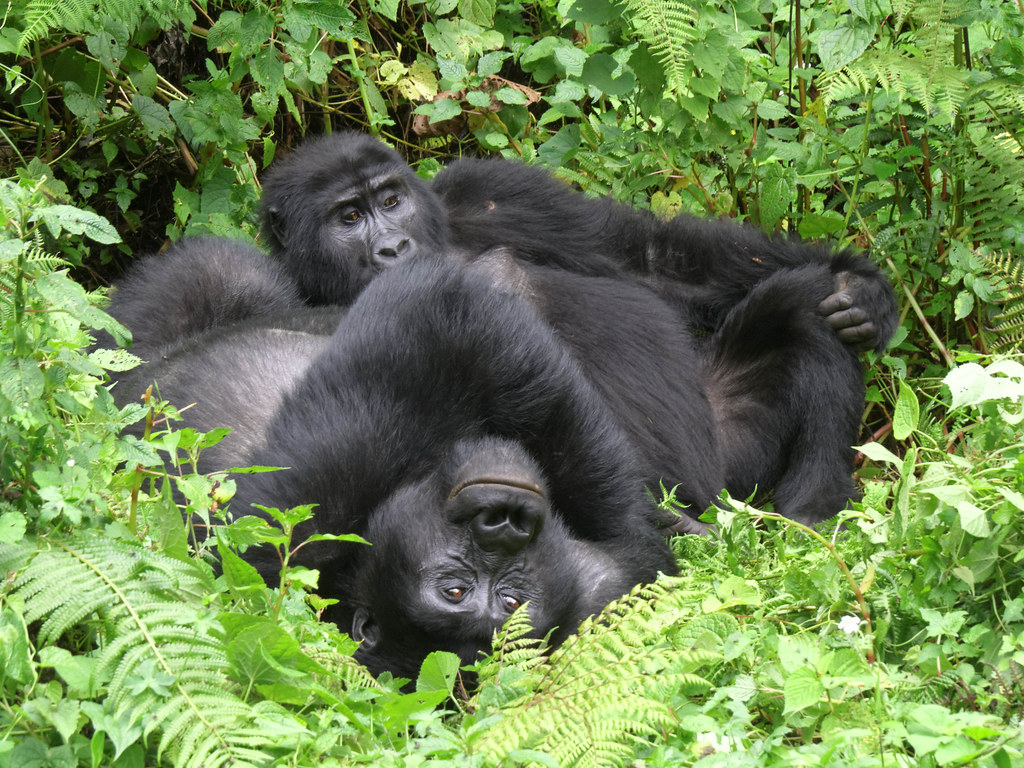In Rwanda, combining cultural tours with gorilla trekking:
Gorilla Trekking: When visiting the Volcanoes National Park in Rwanda, safari guests frequently engage in the well-liked activity of gorilla trekking. Gorilla trekking is without a doubt the highlight of any vacation to Volcanoes National Park. In Volcanoes National Park, gorilla trekking offers visitors the chance to venture on foot into the tropical jungle in search of habituated mountain gorillas.
In Volcanoes National Park, gorilla trekking begins very early in the morning with a training on the guidelines that must be adhered to. Following the briefing, you will begin your trip into the jungle, which might take anywhere from two to six hours, depending on the location of the mountain gorillas. This is because they are naturally nomadic and seek food.
You can see other primates and birds while trekking, and after you locate the gorillas, you will have the opportunity to spend an hour with them in their natural habitat. During this time, you will be able to learn about their habits, behaviors, and how they go about their daily activities, such as playing, feeding, and nursing, as well as record videos and take pictures to show people back home.
Other fantastic activities that can be found in the country include game drives, nature walks, mountain trekking, bird watching, and cultural tours. You may have a comprehensive vacation safari in Rwanda by combining gorilla trekking with cultural activities.
A Rwandan cultural tour offers visitors an excellent opportunity to discover more about the several distinctive cultures that exist in the nation. Furthermore, by participating in a cultural tour in Rwanda, you will have the opportunity to freely engage with different local communities, witness folk dance performances by traditional dance troupes, and sample traditional cuisine made by locals in the communities you will be visiting during the Rwanda cultural safari.
Rwanda is renowned for its natural beauty, which includes green terraced rocks, blue crystal lakes, and its lovely, clean city of “Kigali.” It is also known as the “Land of a Thousand Hills.” In contrast to other nations like Congo and Uganda, which have outstanding cultures that their citizens are ready to highlight to the world, the nation may not have as rich a cultural heritage. Just three ethnic groups are known to exist in Rwanda: the Twa, who were hunters and gatherers; the Tusi, who tended to maintain cattle; and the Tutsi, who were farmers.
Despite this, a lot has changed recently, and various ethnic groups now have different traditions and ways of life. Rwandan cultural excursions give visitors an excellent opportunity to engage with the country’s indigenous people and discover more about their traditional way of life. Tourists on these cultural trips visit Rwanda’s indigenous people, primarily those who reside nearby to the national park.Volcanoes National Park, Akagera National Park, Nyungwe Forest National Park, and Gishwati Mukura National Park, a brand-new national park that was established in 2019, are the only four national parks in Rwanda.
One historical monument that can be combined with a gorilla trekking adventure is the Kings Palace in Nyanza.The king’s palace at Nyanza, which is around 25 kilometers from Butare town, is a must-see for tourists. In addition to learning about the cultural heritage of Rwanda’s past monarchs, visitors will be given the opportunity to see the dorm-style palaces and observe how royal instruments such as drums, spears, shields, and other decorations were used by the monarchs. Additionally, you will have the wonderful chance to be crowned a king or queen.
Rwandan Cultural Exchanges
Another excellent choice for fusing cultural experiences in Rwanda with gorilla trekking would be the Ethnographic Museum in Butare. Learning more about the Rwandan people and their fascinating customs is the primary reason to visit the Ethnographic Museum, which is located a few kilometers from Kigali, the country’s capital. The Belgian government founded the ethnographic museum in Rwanda, which was opened to the public in 1989. Visitors can tour the museum’s seven displaying halls, each of which features cultural items, regalia, and an entertainment center where they can learn more about Rwandan history and culture through traditional tools, farming implements, and much more.
Since Iby’iwacu Cultural Village is too close to Volcanoes National Park, it is typically paired with gorilla trekking. A traditional community called Iby’iwacu is located just outside of Volcanoes National Park. Visitors have a fantastic opportunity to learn about and become enthralled with Rwandan traditional cultures through this cultural trip. It is distinctive in that the males in this community are referred to as reformed poachers who are currently participating in development projects in the national park.
The traditional Intore dance team entertains visitors to the Iby’iwacu cultural village with songs, folk music, and a dance performance. Here, visitors have the chance to participate in some of the traditional food production classes, such as milking cattle, producing local ghee and yogurt, and manufacturing local banana alcohol. Other sites that tourists may see during Rwandan cultural tours include, but are not limited to, Nyamata Church, Camp Kigali, Nyamirambo Women Center, Richard Kandt House, Kimironko Market, and Caplaki Craft Village.
It will be more significant to combine gorilla trekking with cultural trip activities in Rwanda.
Combining gorilla trekking safaris with cultural tours would make for an amazing experience since it would let you to learn about the history of the nation, the traditional methods of life of the elderly Rwandans, and how they differ from modernization today. From creating your itinerary, reserving your lodging, and guaranteeing secure and comfortable transportation throughout your visit, Explore Rwanda Tours will make sure that your memories last a lifetime.

